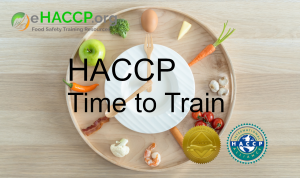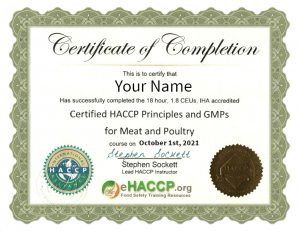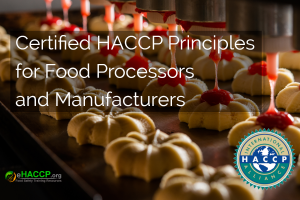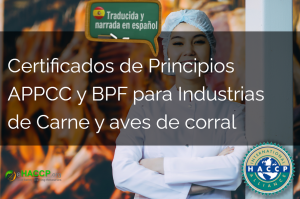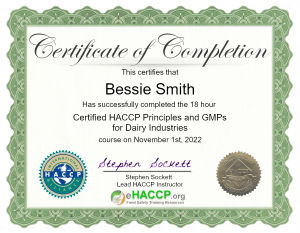Understanding The Importance of HACCP Training Requirements in Meeting FDA, USDA, CFIA, and GFSI Requirements
The HACCP Implementation Training is beneficial for a range of professionals involved in food processing and safety.
I have taken other online training courses and I found this one very well written, easy to follow and content direct.”
LUNENBURG, NS, CANADA, April 9, 2024 /EINPresswire.com/ -- Understanding the importance of HACCP (Hazard Analysis and Critical Control Points) certification in meeting the requirements set by regulatory bodies such as the FDA (Food and Drug Administration), USDA (United States Department of Agriculture), CFIA (Canadian Food Inspection Agency), and GFSI (Global Food Safety Initiative) is crucial for any food-related business aiming to uphold the highest standards of food safety. This comprehensive approach to food safety management not only helps in identifying potential hazards that could compromise the safety and quality of food products but also in implementing effective control measures to mitigate these risks.— Jerry Sullivan
eHACCP.org’s food safety certificate programs are internationally recognized, accredited by International HACCP Alliance (IHA), meet the most recent FDA Food Safety Modernization Act (FSMA) and Global Food Safety Initiative Standards (GFSI), and follow the principles of the FDA Food Code and the international Codex Alimentarius.
Effective food safety management is achieved by applying a proactive approach to identifying the food safety hazards of your business and establishing control measures for all of them.
The eHACCP.org HACCP training and certification serves as a testament to a business's commitment to maintaining rigorous food safety protocols. It is a key factor in ensuring compliance with the stringent regulations established by these authoritative entities, which are designed to protect public health by preventing foodborne illnesses. By adhering to HACCP principles, businesses can demonstrate their dedication to producing safe, high-quality foods, thereby gaining trust from consumers and regulators alike.
This globally recognized certification validates your proficiency in HACCP principles and demonstrates your commitment to food safety excellence.
Compliance with regulations and standards pertaining to food safety serves as the driving force behind safeguarding the integrity of the food supply chain and protecting public health.
By following these steps, a food business can achieve HACCP certification and demonstrate its commitment to producing safe and high-quality food products.
Moreover, achieving HACCP certification can enhance operational efficiencies, reduce waste, and potentially open new market opportunities by meeting international food safety standards.
Implementing a HACCP based food safety system and gaining HACCP certification can be the gateway to increased business opportunities, demonstrating food safety commitment and ensuring the viability of your food business.
Ensuring Compliance with Stringent Regulations Through Comprehensive Training In HACCP Principles
Ensuring compliance with stringent regulations through comprehensive training in HACCP (Hazard Analysis Critical Control Point) principles is paramount for businesses operating within the food industry. Regulatory bodies such as the FDA, USDA, CFIA, and standards like those set by the GFSI demand meticulous adherence to food safety protocols to protect public health. The complexities of these regulations necessitate a robust understanding and application of HACCP principles, which serve as the backbone for developing effective food safety plans.
HACCP (Hazard Analysis Critical Control Points) - HACCP compliance training in the food production and processing industry follows a systematic approach to food safety.
While agencies such as the FDA and USDA help to regulate practices and enforce food safety, compliance with these laws is mandatory.
The Preventive Controls Rule has adopted many of the established HACCP principles while adding new terminologies and procedures for food safety plan development.
eHACCP'org's 18-hour HACCP Certification Program is meticulously designed to equip participants with a deep understanding of these critical principles. The program delves into the seven core HACCP principles, focusing on identifying hazards, determining critical control points, establishing critical limits, monitoring procedures, corrective actions, verification processes, and record-keeping. Through this comprehensive training approach, participants gain not only theoretical knowledge but also practical skills essential for implementing an effective HACCP plan in their operations.
Training programs should provide a thorough understanding of HACCP principles and how to implement them effectively.
The principles of HACCP involve conducting a thorough hazard analysis, determining critical control points (CCPs), establishing critical limits, implementing monitoring procedures, defining corrective actions, conducting verification procedures, and establishing documentation and record-keeping practices.
The process of developing and implementing HACCP plans requires a thorough understanding of the principles involved, technical and operational know-how, and sound management practices.
By ensuring that participants are well-versed in these principles, our program facilitates seamless compliance with the rigorous requirements set forth by regulatory authorities. This not only safeguards public health but also enhances business operations by minimizing risks associated with food safety violations.
To ensure compliance with HACCP regulations, organizations need to actively comprehend and adhere to the requirements.
By implementing robust food safety practices, you can minimize the potential for foodborne incidents and mitigate risks to your business.
Streamlining Food Processing Operations with An 18-Hour HACCP Certification Program
Streamlining food processing operations is a critical goal for any business in the industry, aiming to enhance efficiency while ensuring safety and compliance with regulatory standards. An 18-hour HACCP (Hazard Analysis and Critical Control Points) certification program emerges as a pivotal tool in achieving this objective. This program is meticulously designed to equip participants with the knowledge and skills necessary to implement and manage an effective food safety plan.
This integration helps ensure compliance with industry standards and improves overall efficiency in managing food safety processes.
The training assists with the implementation of Hazard Analysis Critical Control Point (HACCP) programs in commercial and regulatory settings.
Establish and conduct comprehensive training programs to equip all personnel with the knowledge and skills needed to uphold food safety standards.
By integrating HACCP principles into their operations, businesses can identify potential hazards, establish critical control points, and take preventative measures to mitigate risks. This proactive approach not only aligns with the stringent requirements set forth by regulatory bodies such as the FDA, USDA, CFIA, and GFSI but also streamlines processes by minimizing the likelihood of costly food safety incidents. Furthermore, a well-implemented HACCP plan enhances operational efficiencies by optimizing resource use and reducing waste through targeted monitoring and control strategies.
HACCP principles help identify potential hazards throughout the production process, such as biological, physical, and chemical contamination, and establish preventive measures to control them.
Stay ahead of the curve with our proactive approach to the US Food and Drug Administration (FDA), the United States Department of Agriculture (USDA), and the Global Food Safety Initiative (GFSI) regulatory changes.
To create a HACCP plan, businesses can use software solutions such as ERPs and plan builders to streamline the process and reduce operational costs.
Ultimately, completing an 18-hour HACCP certification program empowers food processing professionals with the expertise to refine their operations. It lays down a foundation for continuous improvement in food safety management, ensuring that businesses remain competitive while upholding public health standards.
The HACCP Implementation Training is beneficial for a range of professionals involved in food processing and safety.
This not only ensures continued compliance with food safety regulations but also promotes a proactive approach towards maintaining high-quality standards.
Navigating the Complexities Of USDA and GFSI Standards with Expert Guidance And Support
Navigating the complexities of USDA and GFSI standards can often feel like traversing a labyrinth, with each turn presenting new regulations and requirements that can be both daunting and time-consuming. This is where expert guidance and support become invaluable. Understanding the intricate details of USDA standards, which focus on ensuring food safety in meat, poultry, and egg products within the United States, requires a deep dive into federal regulations that govern food processing and handling.
Complex Requirements: Food safety regulations can be complex and challenging to understand, especially for those without a background in food science or regulations.
For meat, poultry, and egg products, the USDA enforces regulations under the Federal Meat Inspection Act (FMIA) and the Poultry Products Inspection Act (PPIA).
Similarly, adhering to GFSI standards involves aligning with globally recognized benchmarks that ensure food safety through every step of the supply chain.
While each GFSI-recognized standard has its unique requirements, they all aim to ensure the highest level of food safety throughout the supply chain.
Our 18-hour HACCP Certification Program is designed to demystify these complexities. By providing comprehensive training led by industry experts, we empower participants with the knowledge to not only meet but exceed these rigorous standards. Through practical examples, interactive sessions, and real-world applications, our program equips you with the tools to implement effective food safety plans that comply with both USDA and GFSI requirements.
Achieving HACCP certification involves developing a comprehensive HACCP plan tailored to your specific operations.
By providing thorough training on regulatory compliance, organizations can ensure that their employees are equipped with the knowledge and skills to adhere to these guidelines.
Implement a comprehensive food safety plan: Based on the regulations identified, develop a food safety plan that meets the requirements of FSMA or FMIA/PPIA.
This approach ensures that navigating through these regulatory waters becomes a structured journey rather than an overwhelming challenge. With our support, you're not just meeting global food safety standards—you're setting a benchmark for excellence within your organization.
Leaders should demonstrate a strong commitment to food safety principles, providing visible support and involvement to set the foundation for a safety-focused organization.
Achieving Success in The Food Industry By Prioritizing Food Safety And Regulatory Compliance
Achieving success in the food industry is intrinsically linked to prioritizing food safety and regulatory compliance. In a landscape where consumer health and confidence are paramount, adherence to standards set by authoritative bodies such as the FDA, USDA, CFIA, and those outlined by GFSI benchmarks is not just a legal obligation but a cornerstone of business integrity. Our 18-hour HACCP Certification Program is designed to empower professionals with the knowledge and tools necessary to navigate these complex regulations effectively.
Ensuring food safety compliance is crucial for businesses in the food industry.
By achieving GFSI certification, companies demonstrate their commitment to maintaining the highest food safety standards, enhancing consumer trust and confidence in their products.
By combining expert instructors with an engaging learning experience, eHACCP.org guarantees a comprehensive training program that equips individuals with the skills necessary to implement effective HACCP systems.
Understanding and implementing Hazard Analysis Critical Control Points (HACCP) principles is at the heart of ensuring food safety. It's about identifying potential hazards in the production process—biological, chemical, or physical—and establishing critical control points where these risks can be mitigated or eliminated. By proactively addressing these areas, businesses not only comply with stringent regulatory requirements but also build trust with consumers and stakeholders.
Compliance with regulations such as the Hazard Analysis and Critical Control Points (HACCP) system is essential in ensuring food safety.
It identifies potential hazards in the food production process and determines the critical control points where measures can be implemented to prevent or eliminate these hazards.
By proactively addressing issues, businesses can maintain compliance, reduce the risk of contamination, and ensure the delivery of safe products to consumers.
Moreover, this certification facilitates a culture of continuous improvement within organizations. It encourages teams to regularly scrutinize their processes for potential improvements in safety measures, thereby enhancing overall product quality. In an industry where reputation is everything, our HACCP Certification Program equips businesses with the credentials to demonstrate their unwavering commitment to excellence in food safety and regulatory compliance.
Stephen Sockett
eHACCP.org
+1 8664881410
email us here
Visit us on social media:
Facebook
Twitter
LinkedIn
YouTube
Other
Legal Disclaimer:
EIN Presswire provides this news content "as is" without warranty of any kind. We do not accept any responsibility or liability for the accuracy, content, images, videos, licenses, completeness, legality, or reliability of the information contained in this article. If you have any complaints or copyright issues related to this article, kindly contact the author above.

